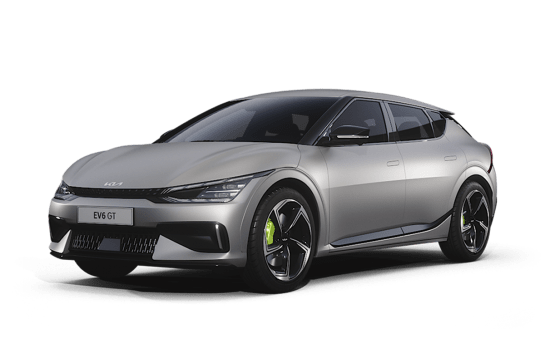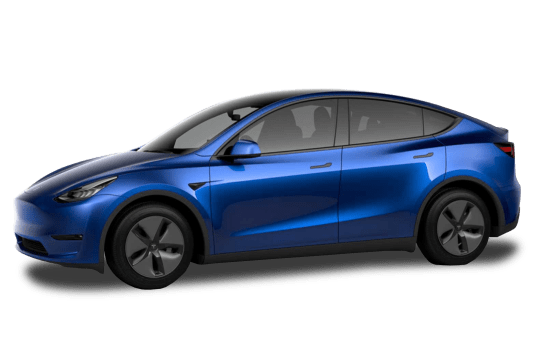
Hyundai Santa Fe VS Kia EV6
Hyundai Santa Fe
Likes
Dislikes
Kia EV6
Likes
Dislikes
Summary
Hyundai Santa Fe
We’re comparing the Kia Sorento Hybrid in the highest spec GT-Line grade and the Hyundai Santa Fe Hybrid in the range-topping Calligraphy spec. Two SUVs so similar they’re pretty much the same, just wearing different clothes.
But there are a couple of crucial differences that might be deal breakers for you when it comes to choosing one over the other. But first, let me give you a bit of background.
The Hyundai Santa Fe and Kia Sorento are direct rivals, but in a sibling rivalry sense as well because both brands are related through a parent company which allows them to share engines and technology, even standard features like stereos and touchscreens.
Read more about
- 'The industry's all about hybrid': Hyundai Australia boss confirms importance of new Tucson Hybrid in taking the fight to the Toyota RAV4 Hybrid, joining Kona, Santa Fe and i30 sedan hybrid models to challenge market leaders
- Updated family favourite spied: 2025 Kia Sportage facelift draws closer as European version of Toyota RAV4 and Mitsubishi Outlander spotted testing - report
- Best SUVs arriving in 2024
So, what you’re really looking at is the best SUVs Hyundai and Kia could independently develop using pretty much the same parts.
The Sorento was updated this year with new tech, improved suspension and some cosmetic changes to keep it looking new.
Thing is, the Santa Fe hybrid in this comparison is the all-new, latest generation version that brings with it a more modern design inside and out and even some safety equipment the Sorento doesn’t have.
And at this point, I'm duty-bound to tell you the Santa Fe has airbags completely covering the third row while the Sorento doesn’t. Didn’t want to bury such vital information further down in the review in case you don't get that far.
Well, with that… let’s get into it.
| Safety rating | — |
|---|---|
| Engine Type | 1.6L turbo |
| Fuel Type | — |
| Fuel Efficiency | 5.6L/100km |
| Seating | 6 seats |
Kia EV6
Sometimes I think the present is nowhere near as futuristic as I thought it would be when pondering things 20 years ago.
And then there are times when the two cars you’re comparing are an electric Mustang SUV and a 580 horsepower Kia that accelerates faster than a Ferrari Enzo.
Yep, this comparison of the Ford Mustang Mach-E GT and Kia EV6 GT is one of those times when we’re reminded how much things have changed and how quickly we need to accept the changes electric cars introduce as the new normal.
Read more about
Supercar-like acceleration, the dilemma of charging and the premium price they command are key EV attributes. But they are still cars. Still the way we get around.
If they’re SUVs like the Mach-E GT and EV6 GT we need to compare more than just their EV credentials. Practicality, driveability, value-for-money, safety and ownership costs are also hugely important.
And this is what we’ve done here, comparing them not just as electric cars but in all the ways you’ll use them, too.
| Safety rating | |
|---|---|
| Engine Type | — |
| Fuel Type | Electric |
| Fuel Efficiency | —L/100km |
| Seating | 5 seats |
Verdict
Hyundai Santa Fe/10
The Hyundai Santa Fe Calligraphy Hybrid and Kia Sorento GT-Line Hybrid are both good value for money, plush, practical and super fuel efficient.
The Santa Fe, however, presents a more compelling case based on its third-row airbag coverage, clever storage and how easy it is to drive.
| Santa Fe Hybrid Calligraphy | Sorento Hybrid GT-Line | |
| Price and features | 9 | 9 |
| Design | 8 | 8 |
| Practicality | 9 | 7 |
| Under the bonnet | 8 | 8 |
| Efficiency | 9 | 9 |
| Driving | 9 | 8 |
| Safety | 9 | 8 |
| Ownership | 8 | 8 |
| Total Score | 8.6 | 8.1 |
Kia EV6/10
The Ford Mustang Mach-E GT wins this comparison with the Kia EV6 GT by a small margin, mainly due to its better practicality, its styling and its lower ownership costs. The Kia EV6 GT is also brilliant in its sporty handling, value-for-money and great battery tech. But if there was one that’s the best all-rounder to live with daily, it’s the Mustang Mach-E GT.
Ford Mustang Mach-E GT | Kia EV6 GT | |
Price and Features | 7 | 8 |
Design | 9 | 8 |
Practicality | 8 | 7 |
Under the bonnet | 9 | 9 |
Efficiency | 8 | 8 |
Driving | 8 | 8 |
Safety | 9 | 9 |
Ownership | 8 | 7 |
TOTAL | 8.3 | 8 |
Design
Hyundai Santa Fe
The Santa Fe and Sorento’s standard features are almost identical but these two SUVs couldn’t be more different in their designs.
The Santa Fe is the newer of the two and this fifth-generation model only arrived in Australia this year, so its boxy styling is more on-trend than the Sorento's design which is a little more rounded.
The Santa Fe’s more blocky build looks good to my eyes but more than a few in the CarsGuide office think the 2015 Land Rover Discovery must have been an inspiration, or perhaps it's just a coincidence.
In Hyundai’s defence the rear of the Santa Fe looks nothing like a Land Rover. Its design with the low placed tail-lights and bloated tailgate looks more awkward than me attempting to high-five someone. Apparently if you look at their elbow it helps. High-fiving that is, not the design of the Santa Fe.
This current-generation Sorento arrived in Australia in 2020 and while an update earlier this year added a few cosmetic styling tweaks to try to keep it looking fresh, I think it's a tough looking, handsome SUV even if the smoother, more rounded design is starting to date.
The LED daytime running lights on both cars are distinctive. The Sorento’s, which skirt the bonnet edge before dropping down the side of the headlights, is a Kia design signature seen across its line-up from the tiny Picanto to the EV9 electric SUV.
The Santa Fe’s 'H' design is unique to Hyundai, a theme that’s mirrored in its tail-lights. The Sorento’s Ford Mustang-style tail-lights look good, but could do with an update.
The interiors are just as different as the exteriors with the Santa Fe’s cabin looking more modern and luxurious in its design with some quirky styling touches (Morse Code dots on the steering wheel anybody?) while the Sorento has a sporty and plush but more conservative look and feel.
These are large SUVs with almost matching dimensions. As you can see in the table below the Santa Fe is only slightly taller and longer than the Sorento.
| Santa Fe Hybrid Calligraphy | Sorento Hybrid GT-Line | |
| Score | 8 | 8 |
Kia EV6
Two more different looking SUVs you could not find. Actually, the EV6 GT barely even looks like an SUV although that’s what Kia calls it and the industry classifies it as such.
Have a look at the images, or better still watch the video we made above, to take in the stark comparison between the styling of these vehicles.
The Mustang Mach-E GT looks reassuringly like a Mustang SUV with its vertical bar tail-lights, the muscular rear haunches, blade headlights, shark nose bonnet and big grille.
Well, it’s not a real grille but if you look closely you’ll see the faint outline of honeycomb mesh behind the semi-transparent plastic.
The Kia EV6 GT looks more like a bloated hatchback than an SUV, but you could argue that’s all an SUV is, anyway, I guess.
Still, it’s a stunning design with its pinched in nose, bulbous and smooth panels, looking low, wide and intimidating like a venomous insect complete with lime green brake calipers.
Despite the obvious exterior differences their dimensions aren’t wildly different as you can see in the table below, only the height sets them apart.
If all you had to go with were these figures I’m sure you’d never imagine they’d belong to two very different looking SUVs. The extra height gives the Mustang GT Mach-E a more upright and boxy design, and this affects practicality as you’ll read about further on. For now let's look at their insides on purely stylistic merits.
Of course they have completely different interiors. The Mustang Mach-E GT has a more macho, serious but sporty cabin with high quality feeling fabrics adorning the dashboard and synthetic leather seats. Only the gigantic portrait media display makes this feel like a modern Ford product.
The EV6 GT’s cabin feels dark, like a cave but one filled with expansive screens and tech. There are intriguing patterns etched into the dashboard and deep seats that wrap around their occupants.
Its innards are as alien as its exterior and I’m here for it. And so are many people. Probably not those who like the Mustang Mach-E GT’s cabin, though.
I think the Mustang Mach-E GT pulls off a better look, especially considering the pressure it’s designers would have been under to create an SUV version of one of the most iconic cars on Earth.
Dimensions | Ford Mustang Mach-E GT | Kia EV6 GT |
Length | 4743mm | 4695mm |
Height | 1623mm | 1545mm |
Width | 1881mm | 1890mm |
Wheelbase | 2984mm | 2900mm |
Ford Mustang Mach-E GT | Kia EV6 GT |
9 | 8 |
Practicality
Hyundai Santa Fe
Not all SUVs are created with equal practicality and even though the Santa Fe and Sorento are much the same in many ways one of these vehicles is more spacious, has better storage and a bigger boot. Oh, and it has two wireless phone chargers, not one.
Yes, it’s the Santa Fe. Not just the more practical one because it’s shaped like a box, although that does have something to do with it. What makes the Santa Fe so much more practical is the interior design with storage more of a priority.
Look at the area under the centre console - there’s a tray big enough for a backpack or handbag. And above it are the two wireless phone chargers, USB ports and cupholders.
There’s the glove box, of course, but above that is a shelf with a grippy surface for keys or wallets and purses. And above that is one of the weirdest contraptions I’ve seen not just in a car, but anywhere - a sterilisation compartment.
It looks like another glove box but it’s actually a space to put anything you want decontaminated - freed from bacteria and germs using UV-C radiation. Stop looking at me like that, I’m serious.
You put your phone in, shut the door, press the UV-C button on the dashboard and 10 minutes later - bing! - your phone is sanitised. Have a look at the video we've made if you still don’t believe me.
The second row of the Santa Fe has excellent legroom, even for me at 189cm tall, and good headroom, too.
For storage, I love the way the centre console box between the driver and front passenger can also be opened from the back by the second row passengers. And below that is a long, deep drawer.
The second row also has door pockets, cupholders and directional air vents, plus USB ports in the sides of the front seats.
Third row seats in SUVs are never the most accommodating for someone my height, but the Santa Fe’s offer good leg and headroom for children. There’s also a USB port on either side along with air vents with fan control and cupholders.
Worth noting the Santa Fe’s large and tall rear doors made putting our toddler into her car seat easier than in the Sorento with its more angular aperture.
The Santa Fe and Sorento have dark-tinted privacy glass for the rear windows and pull-up sunshades.
The six-seat option for the Santa Fe reduces this SUV’s practicality in a couple of ways. Obviously, you lose the capability of carrying seven people, but not being able to have a middle section to slide across to the other side or even just place items on is a problem.
A hire car company might prefer the six-seat option, but if you have a family the seven-seater is the way to go. Not only does it cost less, it's more practical.
The Sorento is by no means impractical, but compared to the Santa Fe there are fewer storage areas in what feels a more compact cabin.
Up front in the Sorento there’s a wireless phone charger forward of the shifter but it’s in a small hidey hole which makes retrieving the phone tricky.
There are USB ports there, too, as well as cupholders and big door pockets. You won’t find a floating centre console with storage underneath as in the Santa Fe, or shelves and there's no sign of a sterilisation compartment.
In the second row the Sorento has little buckets in the doors, bottle holders and more cupholders in the centre folding armrest. USB ports are in the sides of the front seats along with power adjustment controls.
There’s good legroom and headroom in the second row, and directional air vents in the rear of the centre console.
The third row is on the cramped side for me, but most third rows are and they’re really for kids. My eight-year old son wanted me to let you know the windows for back seats in the Sorento are tiny, while the Santa Fe has much larger windows. There are still storage wells, USB ports and fan controls with air vents, though.
The Santa Fe and Sorento both have small cargo capacities when the third row is in place but there's enough space for one carry-on luggage-sized suitcase. With the third-row seats folded flat the Sorento has a volume of 608 litres while the Santa Fe is slightly larger at 628 litres.
| Santa Fe Hybrid Calligraphy | Sorento Hybrid GT-Line | |
| Score | 9 | 7 |
Kia EV6
Electric vehicles have changed practicality for the better. Not being constrained by big engines, transmissions and driveshafts means the packaging can be designed for good storage and people room.
Flat floors open up space, front boots are handy and even the ability to use their colossal battery to power campsites or other appliances is a big plus.
Below is a table comparing boot sizes and power outlets. On the face of it the EV6 GT appears to have the bigger rear boot but the stacking height is lower than the Mustang Mach-E GT’s taller space.
The EV6 GT also has next to no front boot, while the Mustang Mach-E GT has a large storage space under the bonnet.
As for rear legroom, the EV6 GT and Mustang Mach E GT have plenty of space for me at 189cm to sit behind my driving position and headroom is excellent in both.
Entering and exiting the Mustang Mach-E GT is easier due it’s more traditional SUV shape with tall doors and elevated ride height. The EV6 GT is almost 10cm lower overall and I hit my head swinging into the back seat while doing my legroom test.
Both cars have directional air vents in the second row, cupholders, door pockets and USB ports.
Talking of power outlets, only the EV6 GT has a vehicle-to-load (V2L) power outlet which will take a regular household appliance plug.
It’s a tough call as to which is more practical, and while the Kia has the versatile V2L and plenty of space, the Mustang's front boot and ease of entry and exit makes it the winner here.
Ford Mustang Mach-E GT | Kia EV6 GT | |
Seats | 5 | 5 |
Boot capacity (five seats up) | 402L | 480L |
Frunk capacity | 134L | 20L |
Wireless phone charging | Yes | Yes |
USB Ports | 4 | 5 |
V2L socket | 0 | 1 |
Ford Mustang Mach-E GT | Kia EV6 GT |
8 | 7 |
Price and features
Hyundai Santa Fe
We tested the top-of-the-range Hyundai Santa Fe Hybrid here. It’s the Calligraphy grade with all-wheel drive and although it comes standard with seven seats you can also option it with six (as per our test car) and this means the bench seat in the second row is replaced by two 'captains chairs' for a more luxurious feel.
The list price for the Santa Fe Hybrid Calligraphy all-wheel drive is $75,000 and $500 for the six-seat option, so the MSRP comes out as $75,500.
The Kia Sorento Hybrid we tested was also the fancy one in the range. It’s the GT-Line and also all-wheel drive with a list price of $73,330.
As well as sharing a lot of the same engineering these SUVs have nearly identical standard features lists.
Standard on the Sorento GT-Line Hybrid and Santa Fe Calligraphy Hybrid are LED headlights and LED running lights, roof rails, proximity unlocking, privacy glass, rear side window sun blinds and split-style sunroofs.
Both cabins feature Nappa leather upholstery, the front seats are heated and ventilated, while the second-row outboard seats are heated. There’s dual-zone climate control, too.
You’ll find the same curved, double 12.3-inch displays for media and instruments in each, as well as head-up displays. There’s sat nav, wireless Apple CarPlay and Android Auto, digital radio and both have 12-speaker Bose sound systems.
Both feature wireless phone charging but only the Santa Fe can charge two phones wirelessly at the same time. The Santa Fe also has a sterilisation compartment. Sounds weird and is weird… I’ll show you how it works in the practicality section.
| Santa Fe Hybrid Calligraphy | Sorento Hybrid GT-Line | |
| Score | 9 | 9 |
Kia EV6
Electric cars are more expensive than their petrol counterparts and generally will be until the cost of EV batteries comes down. This is what drives the manufacturing price up with the extra cost passed onto the consumer. But the good news is the price is coming down.
That news doesn’t really help you much here because the Kia EV6 GT has come down in price and lists for $99,590, before on-road costs. Still, that’s less than the Ford Mustang Mach-E GT which lists for $104,990.
The EV6 GT and Mustang Mach-E GT sit at the top of their respective ranges and have large batteries. That’s the reason for the $100K MSRP. They both come with a lot of equipment and you can see a side-by-side comparison of their standard features in the table below.
What stands out is the lack of powered front seats in the EV6 GT, and also the absence of leather upholstery in both cars.
Both still come with heated seats, excellent sound systems and sunroofs - although the Mustang Mach-E’s is a large panoramic glass version, while the Kia’s is smaller and opens.
The EV6 GT’s head-up display is brilliant, while the Mustang Mach-E doesn’t have one.
The Mustang comes with 20-inch alloys which offer a better ride than the EV6 GT’s 21-inch alloys - but more on that in the driving section further down.
Ford Mustang Mach-E GT | Kia EV6 GT | |
MSRP | $104,990 | $99,590 |
Media Display | 15.2-inch | 12.3-inch |
Instrument cluster | 10.2-inch | 12.3-inch |
Head-up display | No | Yes |
Climate control | Dual-zone | dual-zone |
Auto parking | Yes - in-car | Yes - remote |
Keyless entry/push start | Yes | Yes |
Sound system | B&O 10 speakers | Meridian - 14 speakers |
Sat nav | Yes | Yes |
Sunroof | Panoramic | Slide opening |
Privacy glass | Rear side | Rear side |
Upholstery | Artificial leather | Artificial leather |
Seats | Front: Powered/heated | Front: heated; Rear: heated |
Wheel size | 20-inch alloys | 21-inch |
LED Headlights | Yes | Yes |
Ford Mustang Mach-E GT | Kia EV6 GT |
7 | 8 |
Under the bonnet
Hyundai Santa Fe
The Santa Fe hybrid and Sorento hybrid share very similar drivetrains - they both have a four-cylinder petrol engine paired with an electric motor and a six-speed automatic transmission with all-wheel drive.
While the drivetrains are virtually identical (because both companies share engines, transmissions, motors and other engineering technology) Hyundai says the hybrid system in the Santa Fe is a generation ahead of the Sorento's.
Hyundai claims its set-up produces more power and torque, but we felt no noticeable difference in the outputs when we drove them back-to-back. You can see all the output figures in the table below.
These hybrids are also not plug-in hybrids - they will recharge through regenerative braking, which means you don’t have to worry about charging - it’ll do it for you automatically. It’s the easiest kind of hybrid to live with.
So, how much fuel will you use? Let’s talk about that.
| Santa Fe Hybrid Calligraphy | Sorento Hybrid GT-Line | |
| Score | 8 | 8 |
Kia EV6
Electric motors make massive amounts of power and torque but the outputs of the Mustang Mach E GT and EV6 GT are beyond 'normal' EVs.
The EV6 GT has a motor driving the rear wheels and another driving the front ones. Together they have a combined output of 430kW and 740Nm with 0-100km/h coming in a brutal 3.5 seconds. That is seriously quick and unnecessary and I love it.
The Mustang Mach E GT also has all-wheel drive thanks to a motor at the front and at the rear but together they make a whopping 358kW and 860Nm, although at 100kg heavier it’s a tad slower to 100km/h with a time of 3.7 seconds. Still these times are quicker than almost any production car from the early 1990s.
Who wins here? I’m calling it evenly matched.
Ford Mustang Mach-E GT | Kia EV6 GT | |
Combined motor output | 358kW/860Nm | 430kW/740Nm |
Drive wheels | AWD | AWD |
0-100km/h | 3.7 seconds | 3.5 seconds |
Ford Mustang Mach-E GT | Kia EV6 GT |
9 | 9 |
Efficiency
Hyundai Santa Fe
We take testing the manufacturer’s fuel efficiency claims seriously and don't take their word for it.
We filled the fuel tanks of the Sorento and Santa Fe with the recommended 91 RON petrol, then set out on a 100km test covering city and urban traffic, motorways and country roads to approximate the combination of conditions an owner would encounter. We then measured the amount of fuel used over the distance to calculate the fuel consumption.
As you can see from the tables below we achieved better results than the manufacturer claims and both of these hybrid SUVs use almost exactly the same amount of fuel. These are large SUVs consuming about 5.0L/100km. That’s outstanding fuel economy.
Not having to plug these kinds of hybrids into an external power source to charge makes them very easy to use. There’s nothing to do, they charge automatically and after a while you’ll just forget it's a hybrid.
| Santa Fe Hybrid Calligraphy | Sorento Hybrid GT-Line | |
| Score | 9 | 9 |
Kia EV6
There’s so much to tell you here and the table below will help with understanding the capacities, ranges and consumption of the EV6 GT and Mustang Mach-E GT.
The Mustang Mach-E GT has the larger battery and the longer range, but the EV6 GT’s battery has a much faster DC charging rate.
The Kia can make full use of a 350kW fast charger while the Mach-E can’t accept more than 150kW. You can see the charging times in the table.
Energy efficiency is crucial to an EV’s range and in our test we filled the batteries of the Mustang Mach-E GT and EV6 GT to 100 per cent and drove a 180km route made up of CBD traffic, motorways, suburban streets and country roads.
At the end of the trip we found both used almost exactly the same amount of electricity at nearly the same rate. The difference being the Mustang had more projected range left because its battery is larger.
Who wins? Well, this is really about energy efficiency and we found that both were a good match for electricity consumption. So, let’s call it a tie. You could argue the Mustang Mach-E GT has more range, but the rebuttal would be the EV6 GT’s super-fast charging time.
Ford Mustang Mach-E GT | Kia EV6 GT | |
Battery capacity | 91kWh | 77.4kWh |
Estimated range | 490km | 424km |
Max DC charging speed | 150kW | 350kW |
DC 10-80 percent charge time | 45 minutes | 18 minutes |
Max AC charging speed | 10.5kW | 10.5kW |
Official combined consumption | 21.2kWh/100km | 20.6kWh/100km |
Distance (energy test)) | 176.5km | 178.0km |
Electricity used | 32.6kWh | 32.18 |
As tested combined consumption | 18.5kWh/100km | 18.1kWh/100km |
Ford Mustang Mach-E GT | Kia EV6 GT |
8 | 8 |
Driving
Hyundai Santa Fe
You’d imagine these two closely-related SUVs with the same engines, same vehicle platform and same standard features would drive the same.
They don’t. We drove them back-to-back for two days on motorways at 110km/h, course-chip country roads and even at walking pace around car parks.
Both are extremely comfortable and composed across every type of road condition. The Sorento, however, has better handling for a sportier drive while the Santa Fe has a ‘floatier’ feel for a more luxurious experience.
An interesting fact for you is that Kia has a local engineering team which tests and develops the Sorento’s suspension for Australian conditions, constantly improving the ride and handling.
The latest retuning was done for this version of the Sorento which was updated this year.
Hyundai also had a local engineering team but doesn’t anymore. Instead, the local subsidiary is most often given a choice of suspension tunes used in other markets in the hope it will work well on Australian roads. The Santa Fe has a 'global' tune.
The hybrid powertrains feel equally matched despite the Hyundai’s slightly higher combined output. Neither feels underpowered and for regular duties they perform well with a smooth transition from motor to engine that only becomes noticeable on hills where electric power isn't enough and petrol has to come to the rescue with a relatively abrupt shove.
If you’re after a sporty experience the Sorento is for you, but I found the Santa Fe’s higher driving position, light steering, more luxurious ride and better visibility through larger windows makes for an easier SUV to drive day in and day out.
| Santa Fe Hybrid Calligraphy | Sorento Hybrid GT-Line | |
| Score | 9 | 8 |
Kia EV6
The way these SUVs feel to drive is as different as their looks. The Mustang Mach-E GT feels more suited to daily driving while the EV6 GT is our pick for the race circuit or sporty blasts on nice country roads with plenty of twists and turns.
Both have drive modes ranging from the hardcore 'Untame' in the Mach-E and 'Sport+' in the EV6 GT to the calmer 'Whisper' and 'Normal' modes in Ford and Kia, respectively.
Adjustable suspension in both firms up the ride for better handling and softens it for a more comfortable setting.
The Mustang Mach-E has the more comfortable ride overall compared to the EV6 GT which is very firm in its Sport+ drive mode but still overly hard in the Normal setting thanks to the big wheels and low-profile tyres. That said, the Mach-E GT is prone to jiggling too much over minor bumps.
The EV6 GT and Mustang Mach E GT can accelerate incredibly fast and while it's fun, the ability to move quickly is useful in overtaking and at intersections without traffic lights.
Neither the EV6 GT not Mach-E GT offer exceptional ride comfort but the Mustang delivers a better all around driving experience with good visibility, a more elevated driving height and supportive seats.
Ford Mustang Mach-E GT | Kia EV6 GT |
8 | 8 |
Safety
Hyundai Santa Fe
At the start of this review I pointed out some crucial safety information about these SUVs. This new-gen Santa Fe has side curtain airbags which fully cover the occupants in the third row, while the Sorento does not.
For many parents, including me, that could be a deal breaker especially if that's all that separates these two similar SUVs.
Still, the Sorento is a very safe vehicle and scored the maximum five-star ANCAP assessment in 2020. The Santa Fe is still so new that its ANCAP rating isn’t in yet, but there’s nothing to suggest it wouldn’t score five stars, too.
Both SUVs have a large amount of advanced safety technology including AEB which can detect pedestrians, cyclists and other cars, lane keeping assistance, blind-spot warning and rear cross-traffic alert with braking.
For child seats both cars have two ISOFIX points in the second row and two in the third. There are also top tether anchor points for each of the seats in the second and third rows.
Both provide full-sized alloy wheels located under the vehicle.
| Santa Fe Hybrid Calligraphy | Sorento Hybrid GT-Line | |
| Score | 9 | 8 |
Kia EV6
The Mustang Mach-E GT and the EV6 GT have been awarded the maximum five star ANCAP rating but the Kia was tested more recently under 2022 criteria.
Both cars have ISOFIX points for child seats in the outside rear seats, while there are three top tether anchor mounts in the second row, too. The table below compares their advanced safety tech.
Ford Mustang Mach-E GT | Kia EV6 GT | |
ANCAP rating | 5 (2021) | 5 (2022) |
AEB | Pedestrian, vehicle, cyclist | Pedestrian, vehicle, cyclist |
Lane Keeping Assist | Yes | Yes |
Blind Spot Warning | Yes | Yes |
Rear Cross Traffic Alert | Yes with braking | Yes with braking |
Airbags | 7 (no centre airbag) | 6 (no centre airbag) |
Ford Mustang Mach-E GT | Kia EV6 GT |
9 | 9 |
Ownership
Hyundai Santa Fe
The Sorento is covered by Kia’s seven-year, unlimited km warranty. Servicing is annual or every 15,000km and over five years the cost averages out to be about $500 per year.
The Santa Fe has Hyundai’s five year, unlimited km warranty and services are recommended annually or every 10,000km, Service cost also averages around $500 each year over five years.
| Santa Fe Hybrid Calligraphy | Sorento Hybrid GT-Line | |
| Score | 8 | 8 |
Kia EV6
The final piece of this comparison puzzle is the ownership costs. The table below highlights the difference in what you’ll pay to service with the Mustang Mach-E GT proving to be the more affordable.
The Kia comes with a longer warranty, although Ford’s battery coverage duration is better.
The Mustang Mach-E GT wins here for its more affordable capped price servicing.
Ford Mustang Mach-E GT | Kia EV6 GT | |
Warranty | Five-year/unlimited km | Seven-year/unlimited km |
Servicing cost total over five years | $780 | $1561 |
Service interval | 12 months/15,000km | 12 months/15,000km |
High-voltage battery warranty | Eight-years/160,000km | Seven-years/150,000km |
Ford Mustang Mach-E GT | Kia EV6 GT |
8 | 7 |








































































